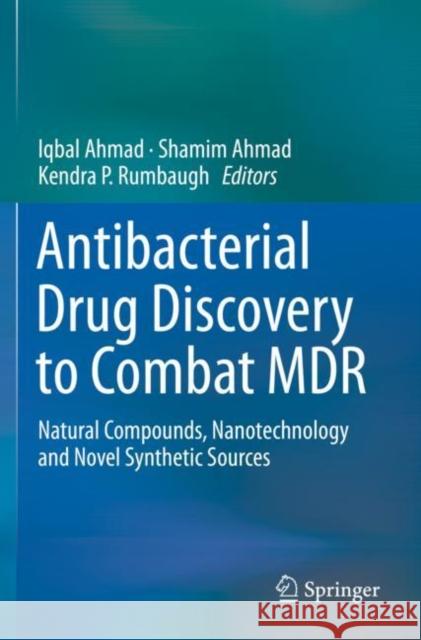Antibacterial Drug Discovery to Combat MDR: Natural Compounds, Nanotechnology and Novel Synthetic Sources » książka



Antibacterial Drug Discovery to Combat MDR: Natural Compounds, Nanotechnology and Novel Synthetic Sources
ISBN-13: 9789811398735 / Angielski / Miękka / 2020 / 680 str.
Antibacterial Drug Discovery to Combat MDR: Natural Compounds, Nanotechnology and Novel Synthetic Sources
ISBN-13: 9789811398735 / Angielski / Miękka / 2020 / 680 str.
(netto: 768,56 VAT: 5%)
Najniższa cena z 30 dni: 771,08
ok. 16-18 dni roboczych.
Darmowa dostawa!
Professor Iqbal Ahmad
Iqbal Ahmad is a Full Professor and former Chair of the Department of Agricultural Microbiology, Aligarh Muslim University, Aligarh, India. He is also the Coordinator, Faculty of Agricultural Sciences, AMU for the BSc (Hons) Agriculture course. He has extensive teaching and research experience in applied & interdisciplinary microbiology and medicinal plant-derived natural products. His present research interest is in the field of AMR in pathogenic bacteria of environmental and clinical origin and conducting research on interference of quorum sensing-linked virulence factors and biofilms by natural products including medicinal plants as a possible alternative strategy to combat MDR. Dr. Ahmad has published more than 150 original research papers, 10 edited books, and 50 book chapters. In addition, he serves as an active reviewer/member of the editorial board for many prominent research journals.
Prof (Dr.) Kendra P. Rumbaugh
Kendra Rumbaugh is a Professor at the Department of Surgery, with joint appointments at the Departments of Immunology and Molecular Microbiology and Cell Biology and Biochemistry at Texas Tech University Health Sciences Center in Lubbock, Texas. Dr. Rumbaugh’s research focuses on understanding and treating wound infections, and she is especially interested in how biofilms, polymicrobial interactions and quorum sensing contribute to bacterial pathogenesis. She has edited books on quorum sensing (Springer) and antibiofilm agents (Springer), and serves on many international science advisory boards, program committees and the editorial boards of many high ranked journals.
Prof (Dr.) Shamim Ahmad
Shamim Ahmad is a senior Professor of Ocular Microbiology at the Institute of Ophthalmology, JN Medical College, Faculty of Medicine, Aligarh Muslim University, Aligarh, India. He has also served as faculty on deputation from AMU Aligarh at the Department of Clinical Microbiology, Al-Arab Medical University, Libya and at the Department of Medical Microbiology, College of Medicine, Faculty of Medicine, King Khalid University, Saudi Arabia. Prof. Ahmad has been a recipient of at least 6 International Fellowships including DAAD (Germany), JSPS (Japan), ROYAL SOC. London (UK), TUBA (Turkey) and SAIA (Slovak Republic) as a Visiting Professor, mostly sponsored by the Govt. of India. Having worked at seven laboratories around the world, his research work mainly involves Multi Resistant Eye Pathogens including Super Bugs, MRSAs and their alternative treatment with newer antibacterial and innovative natural products. Prof. Ahmad serves on the editorial boards of many prominent research journals.
This book compiles the latest information in the field of antibacterial discovery, especially with regard to the looming threat of multi-drug resistance. The respective chapters highlight the discovery of new antibacterial and anti-infective compounds derived from microbes, plants, and other natural sources. The potential applications of nanotechnology to the fields of antibacterial discovery and drug delivery are also discussed, and one section of the book is dedicated to the use of computational tools and metagenomics in antibiotic drug discovery. Techniques for efficient drug delivery are also covered. The book provides a comprehensive overview of the progress made in both antibacterial discovery and delivery, making it a valuable resource for academic researchers, as well as those working in the pharmaceutical industry.
1997-2026 DolnySlask.com Agencja Internetowa
KrainaKsiazek.PL - Księgarnia Internetowa









